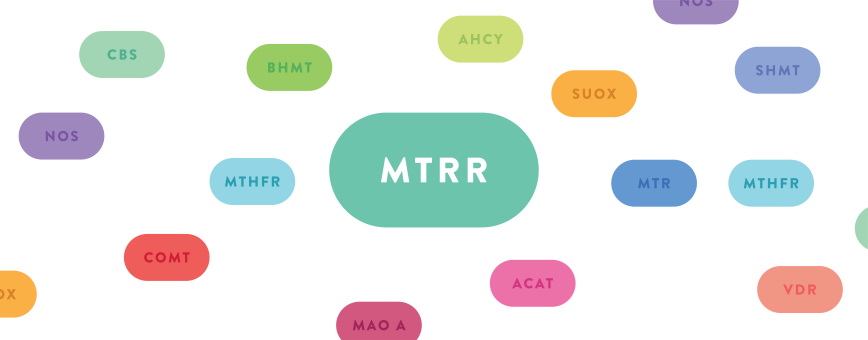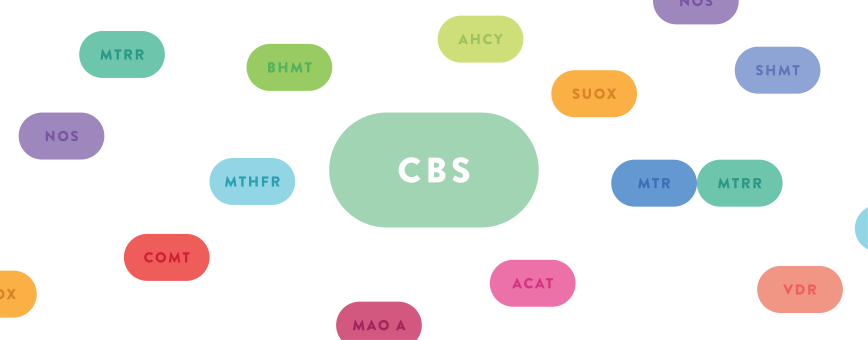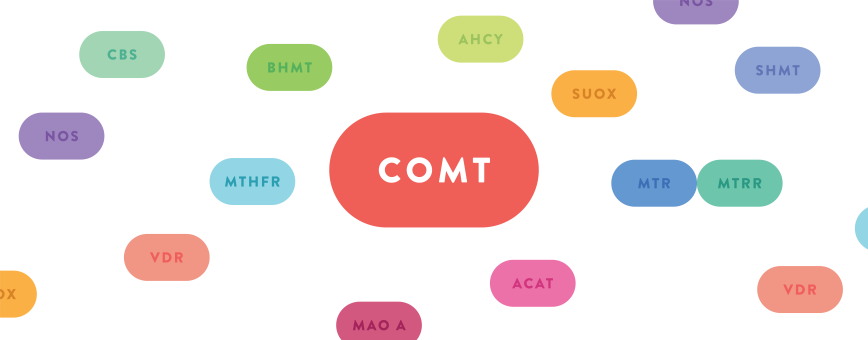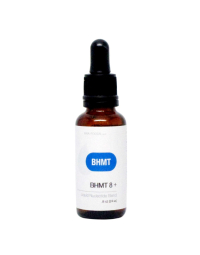The BHMT gene gives your body instructions on how to make the enzyme betaine homocysteine methyltransferase. This enzyme is found primarily in the liver and kidney. It facilitates the conversion of betaine to dimethylglycine, and homocysteine to methionine.1 This reaction is commonly referred to as the “short route” of the methylation cycle.
A Note From Dr. Amy
Because BHMT is central to the “short route”, I use it as a great starting point to help balance the methylation cycle.
BHMT offers a secondary route in the methylation cycle for the conversion of homocysteine to methionine that does not require methylcobalamin B12. The BHMT enzyme utilizes either trimethylglycine (TMG) betaine or phosphatidylserine as starting material to convert homocysteine to methionine.2,3
Because BHMT plays a role in the regulation and metabolism of homocysteine, mutations in this gene will likely present as elevated homocysteine levels. The BHMT dependent conversion of homocysteine to methionine can be affected by stress, cortisol, and may play a role in ADD/ADHD due to the impact it has on norepinephrine levels.4,5
There are four SNPs in BHMT that Dr. Amy looks at in the DNA Nutrigenomic Test: 1, 2, 4, and 8. Dr. Amy has observed that BHMT 8 appears to have a more pronounced effect than BHMT 1, 2, and 4 on BHMT activity. Those who have mutations in BHMT 8 may find they need extra support to compensate for the SNP. Homozygote (+/+) mutations tend to be more influenced than heterozygote (+/-) mutations.
A Note From Dr. Amy
MTHFR, MTR, and MTRR are involved in the “long route” around the methylation cycle, which depends on B12.
I’m not sure if I have a BHMT mutation, how can I find out?
Our DNA Nutrigenomic Test identifies a custom panel of 30 single nucleotide polymorphisms (SNPs), designed by Dr. Amy. This panel tests for 4 different BHMT variations; 1, 2, 4, and 8.
While there are thousands of genes and SNPs that can be examined, Dr. Amy has designed The DNA Nutrigenomic Test panel to focus on 30 SNPs that are part of the methylation cycle. This is a key nutritional pathway in the body that is central to health.
Many of the SNPs in Dr. Amy’s custom panel are in the control or regulatory portion of the gene, meaning these SNPs can have a significant impact on your health. These include some of the more unique SNPs on this panel and are not always covered by other DNA profile tests.
The analysis includes supplement suggestions based on personalized results and provides a comprehensive assessment of the methylation cycle. Proper function of the methylation cycle is essential for several key pathways in the body. When genetic mutations, or “weaknesses”, are present in this cycle, there may be increased risk factors for a range of health concerns. To learn more about the DNA Nutrigenomic Test and The Yasko Protocol, read our Getting Started Packet here.
How can I support my BHMT mutation?
Nutrigenomic pathways are different between individuals and proper supplementation can help support specific imbalances. Holistic Health International offers a variety of supplements to support different BHMT mutations within the SNP Support Category here.
Cellular Energy™ capsules were originally named after those with ACAT & BHMT mutations in their genetics. These capsules help support the balance of cholesterol and other lipids in the body, as well as boosts energy levels.
You do not need to use every supplement listed in each category! Supplements are provided as options to discuss with your own health care professional, to gradually add in as you feel they are needed, and for additional consideration based on biochemical test results.
The beauty of looking at targeted SNPs in the methylation cycle is that it’s a nutritional pathway, meaning if you find a mutation or imbalance in your system, you have ways to support or bypass them.
The information expressed on this webpage does not constitute an attempt to practice medicine nor does it establish a doctor-patient relationship. Content on the site is for informational and educational purposes only. The information expressed is not meant to replace you working with a physician or health care practitioner.
Information and statements have not been evaluated by the U.S. Food & Drug Administration (FDA) and are not intended to diagnose, treat, cure or prevent any disease or be used as the basis for treating a particular symptom or disease. Any products discussed or endorsed are not intended to diagnose, treat, cure or prevent any diseases or be used as the basis for treating a particular symptom or disease. If you have specific healthcare concerns or questions about the products displayed, contact your licensed healthcare professional for advice or answers.
References:
1. Q93088 · BHMT1_HUMAN. Accessed 2023, April 25. https://www.uniprot.org/uniprotkb/Q93088/entry
2. Feng Q, Kalari K, Fridley BL, et al. Betaine-homocysteine methyltransferase: human liver genotype-phenotype correlation. Mol Genet Metab. Feb 2011;102(2):126-33. doi:10.1016/j.ymgme.2010.10.010
3. BHMT Gene - Betaine--Homocysteine S-Methyltransferase. 2023, March 21. Accessed 2023, April 25. https://www.genecards.org/cgi-bin/carddisp.pl?gene=BHMT
4. Wood SK, Valentino RJ. The brain norepinephrine system, stress and cardiovascular vulnerability. Neurosci Biobehav Rev. Mar 2017;74(Pt B):393-400. doi:10.1016/j.neubiorev.2016.04.018
5. Biederman J, Spencer T. Attention-deficit/hyperactivity disorder (ADHD) as a noradrenergic disorder. Biol Psychiatry. Nov 1 1999;46(9):1234-42. doi:10.1016/s0006-3223(99)00192-4










